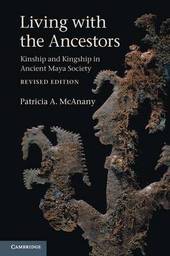
|
Living with the Ancestors: Kinship and Kingship in Ancient Maya Society
Paperback / softback
Main Details
| Title |
Living with the Ancestors: Kinship and Kingship in Ancient Maya Society
|
| Authors and Contributors |
By (author) Patricia A. McAnany
|
| Physical Properties |
| Format:Paperback / softback | | Pages:260 | | Dimensions(mm): Height 229,Width 152 |
|
| Category/Genre | Archaeology by period and region |
|---|
| ISBN/Barcode |
9780521719353
|
| Classifications | Dewey:972.801 |
|---|
| Audience | | Professional & Vocational | | Tertiary Education (US: College) | |
|---|
| Edition |
2nd Revised edition
|
| Illustrations |
1 Tables, unspecified; 37 Halftones, unspecified
|
|
Publishing Details |
| Publisher |
Cambridge University Press
|
| Imprint |
Cambridge University Press
|
| Publication Date |
20 March 2014 |
| Publication Country |
United Kingdom
|
Description
This new edition of Living with the Ancestors contains an entirely new introduction that synthesizes scholarship on ancestralizing practices that has emerged since the 1995 publication of the first edition, which was heralded in Ethnohistory as 'a gem' by Robert M. Carmack. Ancestor veneration in the Maya region traditionally was associated with divine kingship and royal genealogies. In this study, the author challenges this assumption and presents a strong case for agrarian and Preclassic antecedents to the practice of remembering and celebrating forebears and curating their remains close to the dwelling. Integrating archaeological, epigraphic, ethnohistoric and ethnographic information, the author places ancestors within the larger social landscape of fields, orchards and gardens. The many registers of significance on which ancestralizing practices resonate are examined in detail - including spirituality, land tenure patterns, kin relations, and charters of rulership, to name just a few. Although case material is drawn from the Maya region, anyone interested in ancestor veneration will find intriguing material in this study.
Author Biography
Patricia A. McAnany is Kenan Eminent Professor of Anthropology at the University of North Carolina, Chapel Hill. A Maya archaeologist who has conducted field research and cultural heritage programs through the Maya region, she is the founder of the Maya Area Cultural Heritage Initiative and co-founder of InHerit: Indigenous Heritage Passed to Present (www.in-herit.org). She is the author or co-editor of several books, most recently Textile Economies: Power and Value from the Local to the Transnational (2011), co-edited with Walter E. Little; Ancestral Maya Economies in Archaeological Perspective (Cambridge University Press, 2010); Questioning Collapse: Human Resilience, Ecological Vulnerability, and the Aftermath of Empire (2009), co-edited with Norman Yoffee; and Dimensions of Ritual Economy (2008), co-edited with E. Christian Wells. She has published in numerous professional journals and is the recipient of several research awards from the National Science Foundation and of fellowships from the Institute for the Arts and Humanities (University of North Carolina, Chapel Hill), the National Endowment for the Humanities, and the Radcliffe Center for Advanced Study at Harvard University.
ReviewsReview of the first edition: 'Patricia McAnany's book is a gem. The writing style is elegant and stimulating, the argument tight and logically organized, the mix between concept and empirical data balanced, and the focus steadfast. She set out to write a 'different' kind of archaeology of the ancient Mayas, and she succeeded in doing just that. What we get is an 'anthropology' of Maya society rather than a description of artifacts, dates, material sequences, and theoretical jargon. I highly recommend this most readable book.' Robert M. Carmack, Ethnohistory Review of the first edition: 'This well-written book will repay reading by Mayanists and non-Mayanists alike. Besides its holistic approach, its strengths include the explicit recognition that ancient Maya society showed considerable variation over both space and time, and cannot be simply pigeonholed into one or another convenient typological category ... [McAnany] has certainly given Maya archaeologists a lot of ideas to consider in their future research.' William A. Haviland, American Anthropologist Review of the first edition: 'McAnany's book is a constructive and creative attempt to dissolve the conceptual dichotomies that so often in the past have pushed Mayanists into opposed theoretical camps ... McAnany's principal contribution is her attempt to demonstrate through theoretical innovation why such an integrative approach is justified. With her book, a new chapter in the ongoing dialogue among Mayanists is initiated.' Kevin J. Johnston, Reviews in Anthropology
|